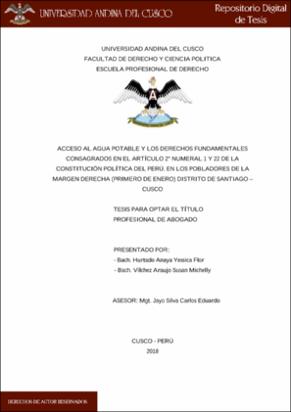| dc.contributor.advisor | Jayo Silva, Carlos Eduardo | |
| dc.contributor.author | Hurtado Anaya, Yessica Flor | |
| dc.contributor.author | Vílchez Araujo, Susan Michelly | |
| dc.date.accessioned | 2018-11-27T13:51:53Z | |
| dc.date.available | 2018-11-27T13:51:53Z | |
| dc.date.issued | 2018-08-16 | |
| dc.identifier.uri | https://hdl.handle.net/20.500.12557/2077 | |
| dc.description.abstract | La presente investigación titulada: “Acceso al agua potable y los derechos fundamentales consagrados en el artículo 2° numeral 1 y 22 de la Constitución Política del Perú, en los pobladores de la Margen Derecha (Primero de Enero) distrito de Santiago –Cusco”, tiene como objetivo principal determinar de qué manera la falta de acceso al agua potable en los pobladores del Sector Margen Derecha (Primero de Enero) Distrito de Santiago, afecta los Derechos Fundamentales consagrados en el artículo 2° numeral 1 y numeral 22 de la Constitución Política del Perú. La presente investigación corresponde al enfoque mixto, de tipo aplicativo y socio jurídico (empírica), con un diseño no experimental; asimismo el estudio tuvo una muestra 673 viviendas que cuentan con agua para el consumo humano del reservorio de Collorpucllo supervisada por ASAPAC; las técnicas utilizadas fueron el análisis documental, la entrevista y la encuesta, usándose como instrumentos el cuestionario con preguntas estructuradas, la entrevista abierta y una ficha para la recolección de historias clínicas. El estudio permitió conocer a través de la contratación de hipótesis las características del agua, en cuanto a: tiempo de uso (174/ 517), frecuencia (517/517), horas (179/517), color (503/517), olor (91/517), calidad (301/517), acceso al desagüe (168/517), en la salud (467/517) y en concordancia a las historias clínicas (40/40), demostrando un mayor porcentaje de respuestas negativas en relación a la calidad del agua y a la salud. En síntesis, se podría afirmar que se vulnera el artículo 2° incisos 1 “toda persona tiene a su integridad psíquica y física y a su libre desarrollo y bienestar.” y 22 “toda persona tiene
derecho a gozar de un ambiente equilibrado y adecuado al desarrollo de su vida.” y el artículo 7-A de la misma que a la letra dice “El estado promueve el manejo sostenible del agua, el cual se reconoce como recurso natural esencial y como tal, constituye un bien público y patrimonio de la nación. Su dominio es inalienable e imprescriptible.” (CPP, 1993). | es_PE |
| dc.description.abstract | The present investigation entitled: “Access to drinking water and the fundamental rights
enshrined in article 2, numeral 1 and 22 of the Political Constitution of Peru, in the inhabitants of the Right Bank (First of January) district of Santiago - Cusco“, Its main objective is to determine how the lack of access to drinking water in the residents of the Sector Margen Derecha (Primero de Enero) District of Santiago, affects the Fundamental Rights enshrined in article 2, numeral 1 and numeral 22 of the Political Constitution from Peru. The present investigation corresponds to the mixed approach, of application type and legal (empirical) partner, with a non-experimental design; The study also had a sample of 673 households that have water for human consumption from the Collorpucllo reservoir supervised by ASAPAC; the techniques used were the documentary analysis, the interview and the survey, using as instruments the questionnaire with structured questions, the open interview and a file for the collection of medical records. The study allowed to know through the hiring of hypothesis the characteristics of water, in terms of: time of use (174/517), frequency (517/517), hours (179/517), color (503/517), odor (91/517), quality (301/517), access to the drain (168/517), in health (467/517) and in accordance with medical records (40/40), showing a higher percentage of responses negative in relation to water quality and health. In short, it could be said that article 2, subsections 1 “everyone has their physical and mental integrity and their free development and well-being is violated“ and 22 “everyone has the right to enjoy a balanced and adequate environment for development of his life. “and article 7-A of the same that to the letter says“ The state promotes the sustainable management of water, which is recognized as an essential natural resource and as such, constitutes a public good and patrimony of the nation. His domain is inalienable and imprescriptible. “(CPP, 1993). | en_US |
| dc.description.uri | Tesis | es_PE |
| dc.format | application/pdf | es_PE |
| dc.language.iso | spa | es_PE |
| dc.publisher | Universidad Andina del Cusco | es_PE |
| dc.rights | info:eu-repo/semantics/restrictedAccess | es_PE |
| dc.source | Universidad Andina del Cusco | es_PE |
| dc.source | Repositorio Institucional - UAC | es_PE |
| dc.subject | Derechos fundamentales | es_PE |
| dc.subject | Agua potable--Acceso | es_PE |
| dc.subject | Constitución política del Perú | es_PE |
| dc.title | Acceso al agua potable y los derechos fundamentales consagrados en el artículo 2° numeral 1 y 22 de la Constitución Política del Perú, en los pobladores de la margen derecha (primero de enero) distrito de Santiago – Cusco. | es_PE |
| dc.type | info:eu-repo/semantics/bachelorThesis | es_PE |
| thesis.degree.name | Abogada | es_PE |
| thesis.degree.grantor | Universidad Andina del Cusco. Facultad de Derecho y Ciencia Política | es_PE |
| thesis.degree.level | Titulo Profesional | es_PE |
| thesis.degree.discipline | Derecho | es_PE |

